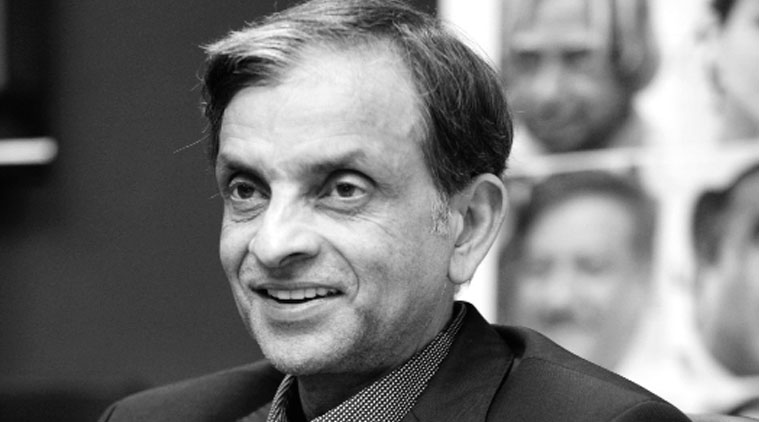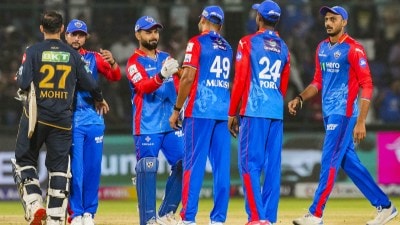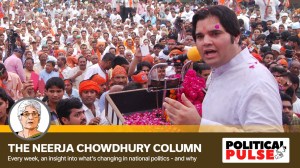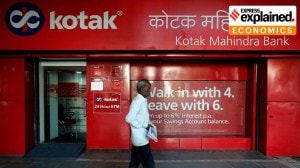- India
- International
‘This is a great time to build up on basketball in India’
Vivek Ranadive talks about his experience as owner of an NBA team and his plans to ‘invest in companies in India’.
 Vivek Ranadive
Vivek Ranadive
Shivani Naik: Mr Ranadive grew up in Juhu. He cracked MIT when he was 16, and there’s a nice little story about him procuring foreign exchange from the RBI. He had camped outside because in those days it was difficult to get foreign exchange.
This was in 1975. I applied to IIT and for some reason they admitted me. But I had always wanted to go to MIT, so I applied there. The same admission officer made the same mistake and admitted me to MIT. The rupee was not a convertible currency and they only gave dollars to graduate students. So, basically they said, ‘look, you’re not going to get foreign exchange to go.’ And I couldn’t even get a visa until I had some dollars to go.
And so the story that you talk about is that I was very determined to go and I just went to the office of the Governor of the Reserve Bank of India. And I just sat there and I wouldn’t go away. So finally, at the end of the day, the secretary said ‘Look, I’ll give you five minutes.’
So when I walked into this cavernous room, somewhere around here, he gave me a way to get some foreign exchange. First he asked why I wanted to go. He said ‘you’re at IIT and that’s a good school. Why do you want to go to MIT?’ But then he found a little angle for me that he could hang his hat on. He said that, ‘if I want say I want to study nuclear engineering, or some branch of computer science that is not offered at IIT, then I could find a loophole to get you some foreign exchange.’ So I said, ‘well of course, that’s exactly what I want to study.’ So that’s how I got the foreign exchange.
Shivani Naik: And some years and many success stories later, he’s here as the owner of the Sacramento Kings, valued at $535 million when he bought the team, in one of the biggest deals. He’s also credited with having digitised Wall Street. Basically what happens is, when you buy stock, it gets registered immediately. The real time updates is what he started.
This was in in 1986. That’s when I invented the software.
Shivani Naik: How did basketball come into the picture?

I was trying to find ways to spend more time with my little girl, Anjali. She was 12-years-old. I foolishly volunteered to coach her basketball team. And for those of you who’d like to read the famous writer Malcolm Gladwell, he wrote a story about this. His latest book, which is in the bookstores is David and Goliath. It’s about me and my daughter and it talks about the story.
So I said I was going to coach a basketball team just to spend more time with her. And I never actually touched a basketball and I showed up at this gym. It was a gigantic gym with multiple basketball courts. I looked around the room, and there were all these ex-division one Duke, Stanford players who were dads coaching the other teams. They were seven-feet tall. And then there was me.
So I was standing in front of these girls and I realised that I was about to make a complete fool of myself in front of my daughter. I didn’t know what to do. And so the first day I said to them, ‘Girls, we’re going to run today.’ So I just made them run up and down for one hour because I literally didn’t know anything about the game.
But I hate to lose. I went back and studied the game a bit and I converted the game into a math equation. Basically, figured out a way to play the game and I ended up winning every single game and taking the team to the national championship.
So that’s how my love affair with basketball started.
Mihir Vasavda: Malcolm Gladwell has very interestingly given the name to that story you mentioned, ‘David and Goliath’. How do you see yourself? David, the winner, or Goliath?
I’m always David. There’s a bigger lesson in that. If you think outside the box and you work harder than anybody else, then David can beat Goliath. And so I try to think of myself, my company, my team, as a David.
Mihir Vasavda: How difficult is it to apply the logic you used with your daughter’s team, to an NBA team?
Well I think the values apply. We actually have a D-League team. And by the way, the first Indian basketball player plays in that team, Sim Bhullar. We use that as a lab to see what ideas we can apply and what ideas are transferrable to the NBA. So I think that the values and concepts and the math applies regardless of the level.
There is a lot of data now, since I bought the team. We looked at 30 gigabytes of data last year and I look at basketball as a big data problem.
Smita Nair: When you talk about fans, we’re always fans of India when they go to play, say cricket. Since you’re in the league format, how do you see this growing in a country where we are still to accept, say a Kolkata team? We’re very regional and we still go as Indian fans. So how do you see the league format here?
I think that in some ways what’s unique about the NBA is that whether you’re born in an African country, or Europe, or China, or Alabama. If you’re a basketball player, you want to play in the NBA. Whereas in soccer there are many different leagues. So basketball is unique in that the NBA is the global platform and it transcends.
Everybody loves Michael Jordan. And one of my partners is Shaq, Shaquille O’Neal. He’s a global icon. Basketball is in someways more than a sport. I was with Abhishek Bachchan yesterday and he’s a big Lakers fan. And obviously, having an Indian player in Sim Bhullar and having an Indian owner makes it, perhaps, more interesting to Indian audience.
Smita Nair: What kind of conversation did you have with Abhishek Bachchan?
Well, first we joked because he’s a big Lakers fan. So I asked him what his favourite number was, and I said ‘well, I’ll give you a purple jersey with that number, but it won’t be a Lakers jersey, it’ll be a Sacramento Kings jersey.’ We wear purple as well. He said ‘forget about it, I’m a Lakers fan for life.’ It shows the thought process. He’s been very successful with his soccer team, and with kabaddi. And he said that he saw great potential in basketball. So I invited him to come to the All-Star games. And he said that the Indian audience have a huge appetite for sports content. And that there’s a lot of pent-up demand. And the kabaddi league validated that. And that mostly they watched movies that was good for his family business. But the younger, more affluent, upwardly mobile, is more into sports. So this is a great time to build up on basketball in the country.
Devendra Pandey: Given a chance, would you buy an IPL team?
You know, I did look at that at one point. But, perhaps not. I’m interested and looking at soccer, I’m looking at kabaddi. But I’m always open to ideas.
Mihir Vasavda: We’ve had plenty of leagues coming up recently, but they haven’t been able to sustain themselves over a short period of time. How does that work over there in a business sense?
I think the NBA has done a really good job of having a sustainable model on a number of
different fronts.
In the US there were two broad models. There was the American football model, where they had salary caps and everybody spent the same kind of money and everything was profitable.
And at the other end of the spectrum you had the baseball model where every team spent whatever they wanted and, that’s why every team lost money.
I think basketball is moving more toward the American football model. There’s a very serious penalty for going above the cap. There’s a luxury tax.
TV revenues are growing — they’ve actually tripled in value. So I think that sports content is incredibly valuable. And the whole arena thing, though most people are watching from outside the arena.
I don’t know how many of you people have been to a basketball game. It is like the greatest show on earth. It is a magical experience, an intimate experience. It’s 21st century communal fireplace. It’s where people get together.
We’re building a new arena in downtown Sacramento. It’s a $500 million project. It’s going to be the world’s smartest building, it’s going to be the world’s greenest building. It’s going to be comfortable. It’s going to the be the world’s first indoor-outdoor arena.
The arena is going to check in to you. So you’re going to walk in, and it’s going to know who you are, it’s going to tell you where to park, it’ll direct you to your seat. You won’t even have to take your phone out, because it’ll recognise you.
But, only 50 nights will it be games, the other 200 nights will be concerts and performances. And I’m hopeful that at some point in the next few years, we’ll have world class arenas in India as well.
Rhik Kundu: Given your technology background, would you consider a technology startup in India?
I think that India is a great market, and also has great resources. So my software company TIBCO has many employees in Pune and Hyderabad. But I think that the best is yet to come as far as Indian technology goes.
While a lot has been done, we’ve only scratched the surface here. So many of the great companies here are basically bodyshops doing cost arbitrage.
Rhik Kundu: Would you consider a startup like that?
Well, I would consider investing in companies in India for sure.
Mihir Vasavda: Do you feel somewhere that sports persons are overpaid?
Not really. I think it’s whatever the market bares. Like I said, it’s easier to be a brain surgeon than it is to be a centre in the NBA. Certainly some of those are gifts that are God given. But they still have to work really hard to make it at that level. They also work only for a few years. And that’s also something that did concern me.
So when I bought the team, the rookie that I drafted, Ben McLemore, came from Kansas to college and grew up in St Lewis. We had a summer league and I took the players out to a nice restaurant for dinner. He had never eaten at a fancy restaurant. So he didn’t recognise anything on the menu. All he recognised was mashed potatoes. So he ordered mashed potatoes for dinner.
So what I did was I created King’s Academy, where I teach my players life-skills. How do you invest your money, how do you order at a nice restaurant, how do you appreciate art, how do you create a life beyond basketball. I don’t think they get overpaid, I think they deserve it.
Shahid Judge: When you’re introduced in public, are you the owner of Sacramento Kings who also owns TIBCO, or the other way around. And what would you consider yourself to be, given your love for basketball and being a Silicon Valley tycoon.
I’ve always been a technology guy and that will always be my passion. And basketball was more of a hobby for me.
But people know me as the owner of the Sacramento Kings. In the business world, people know me as the software guy. Of course, Mukesh Ambani knows me as the software guy, before I got involved with basketball.
But I just think of myself as a person that will continue to do things in technology.
Shivani Naik: How tall are the doors at arenas?
If you guys ever get to come to the arena, the first thing is that you need to go to the locker room and see how big their shoes are. These guys have huge shoes. They’re giants… you see how big and how strong these guys are.
You make a good point. The counter tops are really high. They’re big people. When you see a basketball game, and you see a short little guy, he’s 6”4’ or 6”5’. So next to him you’ll be really small. And he’s the little guy. But you don’t notice it because they’re all so big. It’s only when you stand next to them that you realise.
Even their hands are huge. But they are insanely athletic. I have my players measured all the time, because I’m big into fitness. So I measure their weight and their body fat, and their fat content on a regular basis. These guys are insanely athletic. They have five per cent body fat.
Shahid Judge: Do you still coach once in a while, on the side?
No. I give them my ideas, and whatever they want to take, they take. But I have very smart people in the
organisation.
(Transcribed by Shahid Judge)
Apr 24: Latest News
- 01
- 02
- 03
- 04
- 05







































